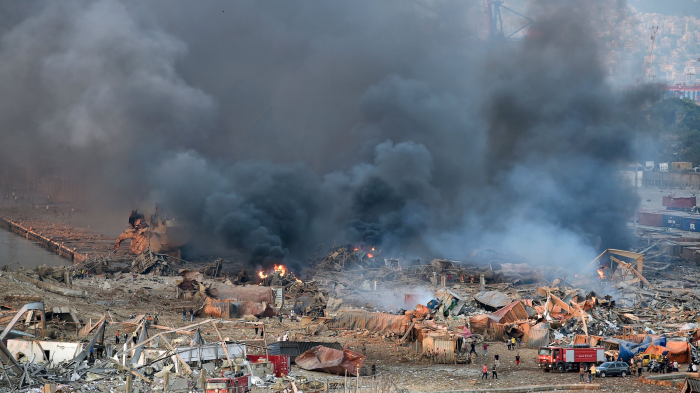Lebanon is in mourning after a huge blast in the capital Beirut killed at least 78 people and injured more than 4,000 others on Tuesday.
The whole city was shaken by the blast, which began with a fire at the port which exploded into a mushroom cloud.
President Michel Aoun said 2,750 tonnes of ammonium nitrate had been stored unsafely in a warehouse for six years.
He scheduled an urgent cabinet meeting for Wednesday, and said a two-week state of emergency should be declared.
The country will observe an official period of mourning for three days from Wednesday.
President Aoun also announced that the government would release 100 billion lira (£50.5m; $66m) of emergency funds.
"What we are witnessing is a huge catastrophe," the head of Lebanon's Red Cross George Kettani told local media. "There are victims and casualties everywhere."
Rescue workers are continuing to search through rubble and the death toll is expected to rise.
Officials said on Tuesday that an investigation was under way to find the exact trigger for the explosion. Lebanon's Supreme Defence Council said those responsible would face the "maximum punishment" possible.
The ammonium nitrate had reportedly been unloaded from a ship impounded at the port in 2013, and then stored in a warehouse there.
The explosion comes at a sensitive time for Lebanon, with an economic crisis reigniting old divisions as the country struggles with the coronavirus crisis. Tensions are also high ahead of Friday's verdict in a trial over the killing of ex-Prime Minister Rafik Hariri in 2005.
What happened?
The explosion occurred just after 18:00 (15:00 GMT) on Tuesday. A BBC journalist at the scene reported dead bodies and severe damage, enough to put the port of Beirut out of action.
Local media showed people trapped beneath rubble. A witness described the explosion as deafening, and video footage showed wrecked cars and blast-damaged buildings.
"All the buildings around here have collapsed. I'm walking through glass and debris everywhere, in the dark," one witness near the port told AFP news agency.
Hospitals were said to be overwhelmed and many buildings were destroyed.
The blast was also felt 240km (150 miles) away on the island of Cyprus in the eastern Mediterranean, with people there saying they thought it was an earthquake.
Their sirens wailing, ambulances inched their way through heavy traffic to get to the site of the blast. Shards of glass blanketed the highway leading into Beirut from the north, as a tractor cleared the rubble.
There's never a good time for such terror to strike a city, but for Beirut, it's hard to imagine a worse time than this.
With Covid-19 infections on the rise, hospitals were struggling to cope. Now, they're faced with thousands of injuries and expecting thousands more.
Hundreds are now displaced; their homes reduced, in a split second, to a twisted, uninhabitable mess of glass and debris.
Lebanon imports most of its food; its economy has been in freefall for almost a year, amid fears of widespread food insecurity to come.
Now all the grain that was stored in the port is gone. In fact, Beirut port itself "is no more", one official said.
Even after the shock fades away, the impact will be hard to fathom.
I saw the fire, but I didn't yet know there was going to be an explosion. We went inside. Suddenly I lost my hearing because apparently I was too close. I lost my hearing for a few seconds, I knew something was wrong.
And then suddenly the glass just shattered all over the car, the cars around us, the shops, the stores, the buildings. Just glass going down from all over the building.
Literally all over Beirut, people were calling each other from different areas kilometres away and they were experiencing the same thing: broken glass, buildings shaking, a loud explosion.
Actually we were shocked because usually when it happens, just one area will experience those happenings after an explosion, but this time it was all of Beirut, even areas outside of Beirut.
Sunniva Rose, journalist
"Driving into Beirut early evening when it was still light, it was absolute chaos. The streets were literally covered in glass. It's hard for ambulances to go through - there's bricks, cement slabs. Houses have collapsed.
"When I got to the port it had been closed off by the army. The army said to stay away in case there was a second explosion.
"There was still smoke going up into the sky late into the evening. The whole city was black. It was very hard to walk around, people were covered in blood. I saw an 86-year-old woman being treated by a doctor who had just run out of his home with a first aid kit. Cars were entirely smashed by rocks. These old-style houses with big cuts of rock had just fallen down on the street.
"It's pandemonium in my own flat, all the glass is shattered. The extent of the damage is extreme. Even in a mall 2km away - the whole facade was shattered."
What is ammonium nitrate?
Ammonium nitrate has a number of different uses, but the two most common are as an agricultural fertiliser and as an explosive.
It is highly explosive when it comes into contact with fire - and when it explodes, ammonium nitrate can release toxic gases including nitrogen oxides and ammonia gas.
Because it's so flammable there are strict rules on how to store ammonium nitrate safely - among the requirements are that the storage site needs to be thoroughly fire-proofed, and there can't be any drains, pipes or other channels in which ammonium nitrate could build up, creating an additional explosion hazard.
What's the situation in Lebanon?
Lebanon is experiencing political turmoil, with street demonstrations against the government's handling of the worst economic crisis since the 1975-1990 civil war.
Many blame the ruling elite who have dominated politics for years and amassed their own wealth while failing to carry out the sweeping reforms necessary to solve the country's problems. People have to deal with daily power cuts, a lack of safe drinking water and limited public healthcare.
There has also been tension on the border with Israel, which said last week that it had thwarted an attempt by Hezbollah to infiltrate Israeli territory. But a senior Israeli official has told the BBC that "Israel has no connection" to the Beirut blast.
The blast happened close to the scene of the huge car bombing which killed ex-PM Hariri. Tuesday's blast also came days before the long-awaited verdict in the trial at a special court in the Netherlands of four men accused of orchestrating the attack.
BBC
More about: Lebanon
















































